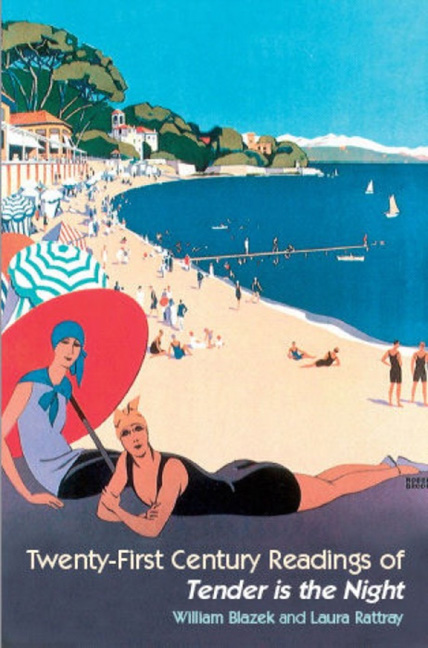Book contents
- Frontmatter
- Contents
- Acknowledgements
- List of Illustrations
- Introduction
- 1 ‘Can't We Put it in Writing?’: Some Short Precursors to Tender Is the Night
- 2 Tender Is the Night, ‘Jazzmania’, and the Ellingson Matricide
- 3 Sanatorium Society: The ‘Good’ Place in Tender Is the Night
- 4 ‘Some Fault in the Plan’: Fitzgerald's Critique of Psychiatry in Tender Is the Night
- 5 An ‘Unblinding of Eyes’: The Narrative Vision of Tender Is the Night
- 6 Si le soleil ne revenait pas: Swiss Clockwork Gone Mad in Tender Is the Night
- 7 ‘A Unity Less Conventional But Not Less Serviceable’: A Narratological History of Tender Is the Night
- 8 American Riviera: Style and Expatriation in Tender Is the Night
- 9 ‘Out Upon the Mongolian Plain’: Fitzgerald's Racial and Ethnic Cross-Identifying in Tender Is the Night
- 10 Gender Anxiety: The Unresolved Dialectic of Fitzgerald's Writing
- 11 Tender Is the Night and the Calculus of Modern War
- 12 Reading Fitzgerald Reading Keats
- Notes on Contributors
- Index
6 - Si le soleil ne revenait pas: Swiss Clockwork Gone Mad in Tender Is the Night
- Frontmatter
- Contents
- Acknowledgements
- List of Illustrations
- Introduction
- 1 ‘Can't We Put it in Writing?’: Some Short Precursors to Tender Is the Night
- 2 Tender Is the Night, ‘Jazzmania’, and the Ellingson Matricide
- 3 Sanatorium Society: The ‘Good’ Place in Tender Is the Night
- 4 ‘Some Fault in the Plan’: Fitzgerald's Critique of Psychiatry in Tender Is the Night
- 5 An ‘Unblinding of Eyes’: The Narrative Vision of Tender Is the Night
- 6 Si le soleil ne revenait pas: Swiss Clockwork Gone Mad in Tender Is the Night
- 7 ‘A Unity Less Conventional But Not Less Serviceable’: A Narratological History of Tender Is the Night
- 8 American Riviera: Style and Expatriation in Tender Is the Night
- 9 ‘Out Upon the Mongolian Plain’: Fitzgerald's Racial and Ethnic Cross-Identifying in Tender Is the Night
- 10 Gender Anxiety: The Unresolved Dialectic of Fitzgerald's Writing
- 11 Tender Is the Night and the Calculus of Modern War
- 12 Reading Fitzgerald Reading Keats
- Notes on Contributors
- Index
Summary
Switzerland provides one of the main settings of Tender Is the Night. Dick Diver spends the climactic years of his youth there: a successful young student, then a promising psychiatrist, this is where he meets Nicole Warren and where they spend their first years together; this is also where they will return when their marriage starts disintegrating. Fitzgerald endows Switzerland with an indisputably symbolic dimension, which will be examined here. It is thus in recognition of Switzerland's importance in Tender Is the Night that this essay partly borrows its title from one of the country's best-known writers. Si le soleil ne revenait pas (which translates as What if the Sun Did Not Return One Morning) was written three years after Tender Is the Night by Charles-Ferdinand Ramuz, a Swiss novelist who spent most of his life in Pully, a small village half way between Lausanne and Montreux on the shore of Lake Geneva, only a few miles from Caux, where Dick's fate becomes sealed to Nicole's.
A Vaudois by birth, like Franz Gregorovius, Ramuz wrote about farmers, vine growers and mountain villagers, far removed from Fitzgerald's Switzerland, which is peopled by idle cosmopolites, mental patients and psychiatrists. Fitzgerald and Ramuz, and the two novels written only three years apart, have very little in common, indeed; therefore, this essay does not aim at a comparative study. Yet Ramuz's title does echo Fitzgerald's: both writers underline the symbolic disappearance of light, Fitzgerald further emphasizing the theme of darkness in his epigraph since, quoting Keats's ‘Ode to a Nightingale’, he omits two lines of the poem (‘And haply the Queen-Moon is on her throne / Clustered around by all her starry Fays’) in an ellipsis that denies all hope of seeing any kind of light and therefore reminds us of Ramuz:
Already with thee! tender is the night […]
[…] But here there is no light,
Save what from heaven is with the breezes blown
Through verdurous glooms and winding mossy ways.
But even more strikingly, Ramuz's title Si le soleil ne revenait pas is of particular interest in its suggestion of fundamental time disruption:
- Type
- Chapter
- Information
- Twenty-First Century Readings of ‘Tender is the Night’ , pp. 103 - 120Publisher: Liverpool University PressPrint publication year: 2007



